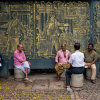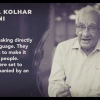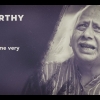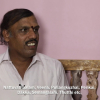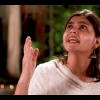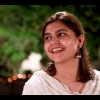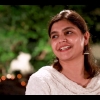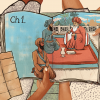Paper presented at a workshop on 'Bhakti Traditions in India', convened by Sahapedia in collaboration with the Sahitya Akademi, Guwahati, May 26–27, 2016.
Lalleshwari, or Lalla Arifa or Lal Ded (Mother Lal) in Kashmiri, was an embodiment of spiritual bliss and an icon of emancipation of a purified human mind having been through a process of emotional catharsis.
The Bhakti movement in its religious and literary manifestations in Kashmir is essentially based on a class of Shaivism known as Kashmir Shaivism. Lalla was a staunch follower of Kashmiri Shaivism. According to T.N. Raina, ‘Apart from the Shaivite Trika Tradition, there is the Bhakti tradition in Kashmir. It is in two forms, either adoration of the non-personal god whose various manifestation are leelas, the devotional songs sung in praise of gods and goddesses. The other tradition that finds itself richly represented in poetry is the Sufi tradition.’
Lalla Arifa, the first Kashmiri poetess of the 14th century remains unmatched till date in the poetic excellence of her vakhyas (compositions of four short quatrain-like stanzas).
I pull my boat with a slender thread
In the ocean
Will Lord hear me and ferry me across?
Like water in vessels of unbaked clay, I am wasting away
Oh, how I long that I reach my home!
Red ambers burn even my bone marrow
Still I admire you
And this pain I bear only for you
And no one else.
Lalla’s story is the sad story of a poor Kashmiri woman. In her in-laws' home, very inhuman treatment was meted out to her by her mother-in-law who would put a round stone in the bowl from which Lalla ate and cover it with a very thin layer of cooked rice. Lalla had to go hungry but she never complained of her plight to anyone, except for putting across her agony in poetic compositions like the one below:
For my wooden bow, I have a reed for an arrow
An unskilled carpenter for building my mansion
A body un-cleaned by waters holy
Oh, how can I tell my plight?
Finally, she chose to leave her in-laws and began her spiritual journey. When she discarded her clothes, the people around asked her to abandon this unethical way of life and cautioned her that as a woman she must cover her body properly and should be ashamed of this act. She hit back asking, ‘Ashamed of whom? Where is a man seen here before whom I should be ashamed?’ One day she saw a bearded person of imposing personality, wearing a snow-white turban coming in her direction. She was frightened and ran helter-skelter. When people enquired what happened that so terrified her, she said, ‘For the first time in my life, I have seen a man. I am ashamed, for I can’t face him because I am naked’. There after she found a baker’s shop, rushed towards it and jumped into the burning oven. She was reduced to ashes and it is said fragrant flowers sprang out from the ashes within the oven. Since both Hindus and Muslims had claimed Lalla as their co-religionist, they distributed these flowers among themselves and performed the last rites of Lalla each according to their tradition.
The man she had seen was none other than Hazrat Mir Syed Ali Hamadan, the most revered Muslim saint who had come to Kashmir from Hamadan and spread Islam in the Valley.
On the one hand Lalla sang mesmerising devotional Bhakti songs originating from Kashmir Shaiva philosophy and on the other her junior contemporary, Sheikh Nooruddin Noorani, the first Kashmiri poet of the same century, propagated humanity, brotherhood and unity among communities in the light of Islam. His ashloks are therefore called Holy Quran in Kashmiri. The legend says that when the Sheikh was born he refused to suck milk from his mother’s breasts. Lalla appeared on the scene and rebuked the infant Sheikh asking him, ‘You were not ashamed of being born, why do you hesitate to live?’ It is said that Sheikh readily sucked milk from the breasts of Lalla, 60 years old at the time. Thus she became the spiritual guide of the Sheikh, to whom he sang praises in this verse:
That Lalla of Padman Pora (Papmore village)
Who drank nectar of life.
She is our mentor and teacher.
O Lord, bestow upon me the same bliss.
According to Lalla’s Bhakti or mystic poetry, God doesn’t assume any concrete shape. He is all light which is not hidden in any material being or at some particular place. It has as its abode the heart of the human being and when a person identifies its proper placement it is called divinity of thought and mind. Lalla recognised Shiva or Omkar merely as a name of God. Otherwise she had accepted the real God within herself before whom she would time and again pray in supplication that he bestow upon her eternal joy in the form of spiritual magnificence and the ascent of the soul into the unknown world of the highest mystic order.
O my Lord, who has no shape or form
Bind me within your sight
Make me ascend to unknown heights
I always remember you, my king Lord!
Lalls was strictly against the worship of idols. She has expressed her disapproval of this custom at many places:
Idol is of stone, temple is stone,
Above (temple) and below (stone) are one
Which of them will thou worship foolish Pandit?
Cause thou the union of mind with Soul.
*
When my mind was cleansed of impurities,
I recognised the self in me.
When I saw him dwelling in me
I realised that He was everything,
And I was nothing.
Lalla Arifa, with her superb dispensation of mystic poetry, has surpassed all others till date, and has on the other hand impressed and inspired the concept and enriched the vakhya genre spanning 700 years. Today, it is customary at every musical performance that the singers begin with a recitation of Lalla’s poetry in obeisance to the greatest poetess of Kashmir. Shams Faqir, the renowned mystic Kashmiri poet of the 19th century, pays his tribute to Lalla Arifa in these words:
Carrying with her the wealth of surpassing excellence,
When she went to a holy ghat for bathing
She swam across to an abode, where there was no one except God.

